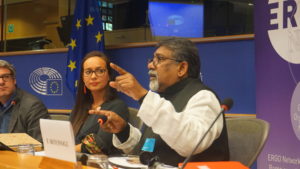ERGO Network voices major steps to take to achieve true leadership and participation and to combat antigypsyism at the 2019 OSCE Human Dimension Implementation Meeting
Our Policy and Research Coordinator Jelena Jovanovic recently took part in the OSCE Office for Democratic Institutions and Human Rights (ODIHR) annual human rights conference: the Human Dimension Implementation Meeting (HDIM). She read a statement on Roma participation and leadership and presented the work on developing concrete measures to combat antigypsyism, measures the Alliance against Antigypsyism proposes to the EU institutions and EU Member States as well as Candidate Countries.
During the working session ‘Roma and Sinti participation in public and political life’, Jelena Jovanovic spoke about participation as a human right and pointed out that committing to the empowerment of a systematically disempowered group to achieve true participation in various societal and political affairs would play a crucial role in advancing democratic governance, the rule of law and socio-economic development. ERGO Network called upon the OSCE Participating States to develop measures with direct Roma empowerment as an objective, to envision and foster quality participation at all levels and all stages of policy making, to develop national policies addressing Roma participation by positive actions, including in administrative personnel, while being conscious that Roma should not only be part of processes narrowly defined as ‘Roma issues’.
We also urged the Participating States to devise tools and resources for empowering grassroots organisations, to develop indicators to measure the frequency and quality of Roma participation and leadership and to contribute to diversifying Roma participation while embracing an understanding that besides ‘women’s’ and ‘youth issues’, Roma women and youth have diverse expertise and should also occupy high level positions. ERGO strongly emphasised that the same understanding should be applied to other social groups on the intersections of different categories of difference such as sexuality, class, disability, geographical location. Marginalised groups’ representation affects other people in similar positions to get more confidence to voice their needs.
During the side event focusing on “Racism, intolerance and violence against Roma and Sinti in the OSCE area”, we explained challenges with regards to legislation, policy development and concrete interventions. Many civil society organisations, the European Parliament, the European Commission, United Nations and other institutions and organisations highlight the persistent antigypsyism at all levels of European society, despite the efforts undertaken under strategies and action plans for Roma and national legislative frameworks against discrimination and hate crime.
ERGO Network called upon OSCE participating states to take stock of the situation and adopt complementary policy measures to respond to the challenges experienced by Roma in Europe. We suggested specific measures in terms of recognising present and historical responsibility and improving institutional frameworks, collecting data and monitoring antigypsyism and enabling access to justice.
You can read here our statements on participation and leadership and on combating antigypsyism and the ODIHR Third Status Report from 2018 focusing on participation in public and political life.




 Paul Divakar, Chairperson of the Asia Dalit Right Forum, brought the global perspective to the panel and pointed out that the SDGs must be designed in a way that they also serve those who are excluded in their societies, across the globe. “If we are not named in the indicators, if there are no data, what do we do? That´s why need to fight for our rights together.”
Paul Divakar, Chairperson of the Asia Dalit Right Forum, brought the global perspective to the panel and pointed out that the SDGs must be designed in a way that they also serve those who are excluded in their societies, across the globe. “If we are not named in the indicators, if there are no data, what do we do? That´s why need to fight for our rights together.”